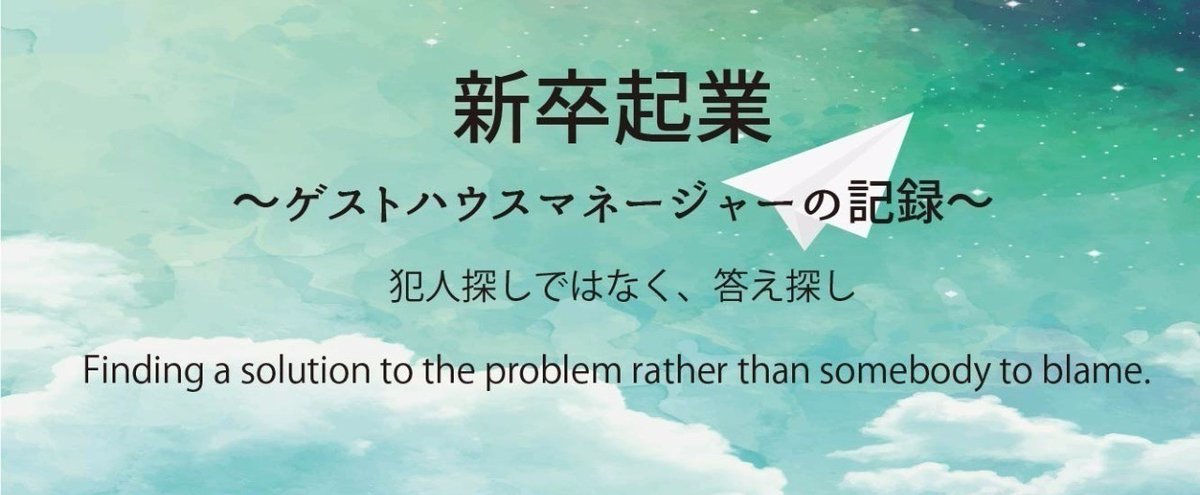
犯人探しではなく、答え探し~Finding a solution to the problem rather than somebody to blame.~
先日 Tobiu Campというものに、Guest House wayaで出店してきました。
Tobiu Campは、年に一回白老という場所で行われます。
かなり面白いイベントなので、詳細が気になる方はこちらをご覧ください。
今ではかなりの規模となり、札幌からも多くの人が参加するイベントとなっています。(札幌から飛生までは、車で片道2時間弱ほどです。)
冒頭で述べた通り、Guest House wayaとして、このキャンプで出店を行いました。
合同会社Staylinkのメンバー全員でこのキャンプに参加することが決まっていたので、僕と代表の河嶋はwayaとyuyuの両宿を一日担当し、締め作業が終わった深夜から、キャンプへと向かいました。
到着したのは、深夜2時半。
夜が更けているのにも関わらず、その場所は異様な雰囲気を漂わせて、入り口から非日常の世界を感じることができました。
しかし、ついた途端に一つトラブルが発覚。
翌朝にコーヒーとサンドウィッチを販売する予定でしたが、コーヒー用のフィルターが大雨により、使えなくなってしまいました。
さて、どうしたものか。
「なんとかなるよ。とりあえずお酒は飲まないでおくから対応策決まったら教えて。」
僕と河嶋はその一言だけ添えて、その事柄に対する判断はクルーに委ねることにしました。
1時間弱ほど Tobiu Camp内でのイベントやそこに集った人たちとの談笑を楽しんだ後、河嶋から一本の連絡がきました。
「札幌まで戻って必要な道具を取りに行くことになったよ。」
その連絡をもらい、僕と河嶋で一旦札幌に戻ることにしました。
往復で4時間弱かけて必要な備品を揃え、朝のサンドウィッチとコーヒーは無事に完売。
せっかくみんなできたのだから、みんなで楽しみたかったという心残りはもちろんありますが、いつも頑張っているみんなが楽しんでくれたのなら、それだけでも十分。
加えて、このトラブルによっても気づきがあったので、このブログに書こうと思います。
①犯人探しではなく、答え探し
だいたい問題が起こると、その現実を受け入れられず、その問題を導いた犯人を探すことに時間を割いてしまう傾向があります。
しかし、犯人探しの狙いは、再犯を起こさぬよう指導するのが目的です。
問題が起こり、一刻を争う状況になった時、優先順位は犯人探しではなく、答え探しです。
その状況での最優先事項は何か?
どのような行動を今取るべきなのか?
判断が遅れてしまうと、手遅れになってしまうことだってあります。
まずは、状況を受け入れること。そして、最適な行動を決めること。
犯人探しではなく、答え探し。
問題が起きたとしても、常にこのことを念頭に置いておけば、間違った行動を取ることはありません。
②「なんとかなるよ。」の本当の意味
経営者やプロジェクトリーダーなどの、人の導く立場にある人はよく「なんとかなるよ」という言葉を使うと思います。
僕もこの言葉は多用します。
多用するあまり、「ちゃんと考えなよ」と言われることがあります。
しかし、「なんとかなるよ」という言葉は、決して何も考えてない楽観的思考により言っているわけではありません。
リーダーが言うこの言葉の本質は、「どんなことが起きようとも、最終的には絶対に何とかする」という決意からきています。
投げやりに言っているわけでも、現実逃避をしているわけでもなく、最終的には全責任を負う覚悟と、相手への信頼をもとに発しているのがこの言葉です。
何か想像もしていなかったような問題が起きた時にも、自分自身に「なんとかなる」と言い聞かせることはとても大事です。
その理由の一つとして、悲観的に物事を考えてしまうと、より一層落ち込んでしまい、落ち込んだ思考のまま対応策を考えたとしても、良い改善策が思いつかないので、最悪の結果が生じると言う負のスパイラルになってしまうためです。
悲観的に捉えるのではなく、積極的に問題を解決しようと前のめりで思考することによって、良い改善策と良い結果が生まれるはずです。
もう一つ理由があり、「なんとかなるよ」と自分に言い聞かせると、ではどうすればなんとかなるかなと逆算を始めるはずです。
最悪の状況の中、最高の未来を描き逆算する。
そのプロセスがとても大事です。
そのプロセスまで持っていくために、「なんとかなるよ」という洗脳を自分自身にかけます。
最悪の状況の中、最高の状況に持っていくためには何ができるか?
常に良い結果を出すために大事な思考回路です。
「なんとかなるよ」
ぜひ使ってみてください。
誰かを責めたくなる時や、状況を受け入れたくなる時は多々あると思います。
そんなことをしていても、次には繋がりません。
常に未来に繋がる思考と行動を。
この思考を持ちながら、前に進んでいきましょう。
A few days ago, we set up a booth at Tobiu Camp, a festival that is held every year in the town of Shiraoi.
It is quite the interesting festival. If you're curious, please check it out here.
The scale of the festival is rather large, and is joined by many people who live in Sapporo (it is about a 2 hour drive from Sapporo to Shiraoi).
As I wrote in the beginning, we set up a booth there, where we were selling curry and beer in the evening, and sandwiches and coffee the following morning.
We decided to do this so that every member of our crew could take part in the festival.
In order to do so, Shun (the CEO of our company) and I worked at Waya and Yuyu respectively, up until closing time.
After closing up, we headed to Shiraoi to join our crewmates.
We arrived there around 2:30 am.
It was dark, but the atmosphere could be felt instantly, like we'd gone through a portal to another world, and I was excited.
Unfortunately, we had a problem. Due to heavy rain, the filters for the coffee we intended to sell in the morning were soaked to the point that we could no longer use them.
We thought about what we could do.
Shun and I told our crewmates, "everything will be okay in the end. For now, we will not drink alcohol, so just let us know what you want to do", and then we left the decision up to them.
I enjoyed walking around Tobiu camp for about an hour, talking with many of my friends who also happened to be there, and then I eventually got a phone call from Shun.
He said, "let's go back to Sapporo and bring everything we need for the morning."
So off we were, back to Sapporo.
We made the round trip in 4 hours and brought everything we needed, and thus we were able to sell everything we needed to sell.
Of course, I wished I could've enjoyed the festival more with my crewmates, but I took solace in the fact that these people who always work so hard for us were able to enjoy it themselves. It meant a lot to me.
I also learned quite a bit from the problem that arose, so I'd like to write a bit about it here.
1. It is more important to find a solution than it is to find someone to blame.
Usually, when a problem occurs, our first instinct is to figure out who is at fault.
However, the only reason to find the person at fault would be to give them the right guidance, in order to prevent the problem from occurring again.
This can be done later, and so the top priority should be to find a solution to the problem at hand first.
What is the best decision we can make in this situation?
What is the best action we can take right now?
If you are unable to come up with a solution quickly, there is the possibility that the problem with persist, or even grow bigger.
First of all, we have to accept and understand what happened, and then decide what to do about it.
Finding the solution is much more important than finding out who's fault it is.
If you keep this in mind, you won't go wrong when problems inevitably occur.
2, The true meaning of “everything will be okay in the end.”
Many leaders in various fields like to say something along these lines: everything is going to be okay. It will all work out.
I also say it often.
I say it so often that I'm sometimes told to be more careful with my use of such words.
However, to me "everything will be okay" does not mean that I'm being blindly optimistic and not considering the outcomes thoroughly.
I feel that when saying "everything will be okay," the person saying the words means that they have already made the decision to make it work out somehow, and that they will go to any lengths to do so. To say everything will be okay is so make a promise to others and to yourself that you will not waver in your determination.
It does not mean giving up on trying and leaving it to chance, or that we should just escape from the reality of the situation as it is now out of our hands. People who say these words have the resolve and confidence to fix the problem at hand, and they are prepared to accept the responsibility for the outcome and the burden of being trusted in.
When the unexpected happens (it most certainly will happen), it is very important that you believe that everything will be okay in the end. A large reason for this is that attitude plays a major role in results. A negative attitude towards the situation can only decrease the chances of it working out in the end.
You are more likely to be feeling down about it all, and with that feeing comes a mind clouded with thoughts that obstruct your view of the solution.
Your attitude plays a major role in finding a solution. A positive mindset will lead to positive results.
Another reason to say everything will be okay is that it sets a clear cut goal, which you can now
construct a path towards. You will be forced to think in terms of what actions you can take in order to make your statement a reality.
Forming an image of how you want things to turn out allows you to take the actions that will allow that image to manifest in the future.
This though process is crucial for getting the desired results. You are, in essence, brainwashing yourself to believe that there is a solution to any problem, and that you are capable of finding that solution. You will ask yourself simple questions such as "what can we do to turn the current situation into the ideal one?" which will lead to surprisingly satisfying results.
It is very easy to wallow in the misery of the situation and point the finger at somebody. However, you will not move forward in any way if you go about things in such a manner.
It is important to remain level-headed, first thinking of what actions can be taken and having the mindset that will allow those actions to take place.
Let's keep these thoughts in mind when the next problem inevitably occurs.
いいなと思ったら応援しよう!

